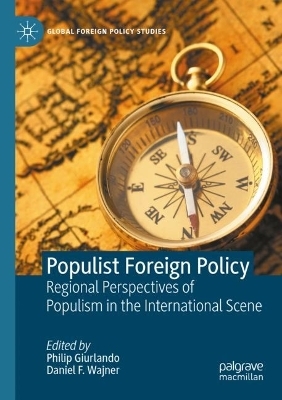
Populist Foreign Policy
Springer International Publishing (Verlag)
978-3-031-22775-2 (ISBN)
The empirical analysis sheds new light on how populists' distinctive conception of a world divided antagonistically between "the people" and "the elites" influences behaviour towards multilateral organizations such as the United Nations and the European Union, and regional or global hegemonic powers like the United States, Germany, Russia, and China. The book also shows how ideas related to identity, ideology, status and emotions, impinge on populists' conduct vis-à-vis other international actors, and how national and international structures affect the implementation of populist foreign policies in the regional, interregional, and global arenas. The wide geographical diversity and regional representation are also valuable in identifying cultural similarities and differences. Hence, the findings contribute to lively debates on whether there is a unified and coherent foreign policy among populist leaderships, and whether populism leads to a gradual "corrective" of transnational trends in contemporary politics or, conversely, to a more radical, structural shift in the liberal international order.
Philip Giurlando is Assistant Professor of International politics at Xi'an Jiaotong-Liverpool University. Populist foreign policies are one of his core areas of research, and his most recent publication on the subject is "Populist Foreign Policy: The Case of Italy" in the Canadian Journal of Foreign Policy.
Daniel F. Wajner is Lecturer (Assistant Professor) in the Department of International Relations and the European Forum at the Hebrew University of Jerusalem. He has published academic articles on populist foreign policies, with a particular focus on Latin America, Europe and the Middle East, in British Journalof Politics and International Relations, Comparative Political Theory, Journal of International Relations and Development, and Latin American Research Review.
1. Introduction to Populist Foreign Policy (PFP).- 2. Digging New Western European Trenches: Populism and the Foreign Policies of Germany and the Netherlands.- 3. Populist Foreign Policy in Southern Europe.- 4. Populist Foreign Policy in Central and Eastern Europe: Poland, Hungary and the Shock of the Ukraine Crisis.- 5. The Trump Shock: Populism and Changing Narratives of US Foreign Policy.- 6. Tradition, Geopolitical Constraints, and Leadership Styles in Latin American Populist Foreign Policy.- 7. Populist Foreign Policy in the Middle East and North Africa.- 8. Leadership, Context, and Populist Foreign Policy in East Africa: An Analysis of Uganda and Rwanda.- 9. Populist Foreign Policy in Asia.- 10. Aotearoa New Zealand and the Quasi-Populist Foreign Policy of New Zealand First.- 11. Conclusions: Populist Foreign Policy in a Comparative Perspective.
| Erscheinungsdatum | 12.05.2024 |
|---|---|
| Reihe/Serie | Global Foreign Policy Studies |
| Zusatzinfo | XV, 290 p. |
| Verlagsort | Cham |
| Sprache | englisch |
| Maße | 148 x 210 mm |
| Themenwelt | Sozialwissenschaften ► Politik / Verwaltung ► Europäische / Internationale Politik |
| Sozialwissenschaften ► Politik / Verwaltung ► Vergleichende Politikwissenschaften | |
| Schlagworte | Africa • Eastern Europe • foreign policy • Latin America • Middle East • North America • Oceania • Populism • populist governments • populist leaders • regional IR • Southeast Asia • Western Europe |
| ISBN-10 | 3-031-22775-1 / 3031227751 |
| ISBN-13 | 978-3-031-22775-2 / 9783031227752 |
| Zustand | Neuware |
| Haben Sie eine Frage zum Produkt? |
aus dem Bereich


